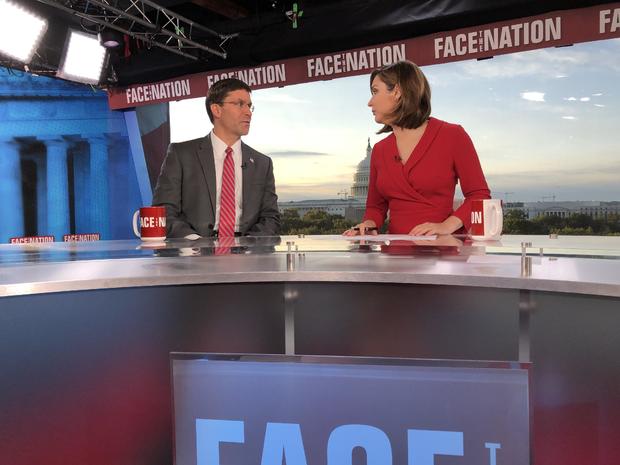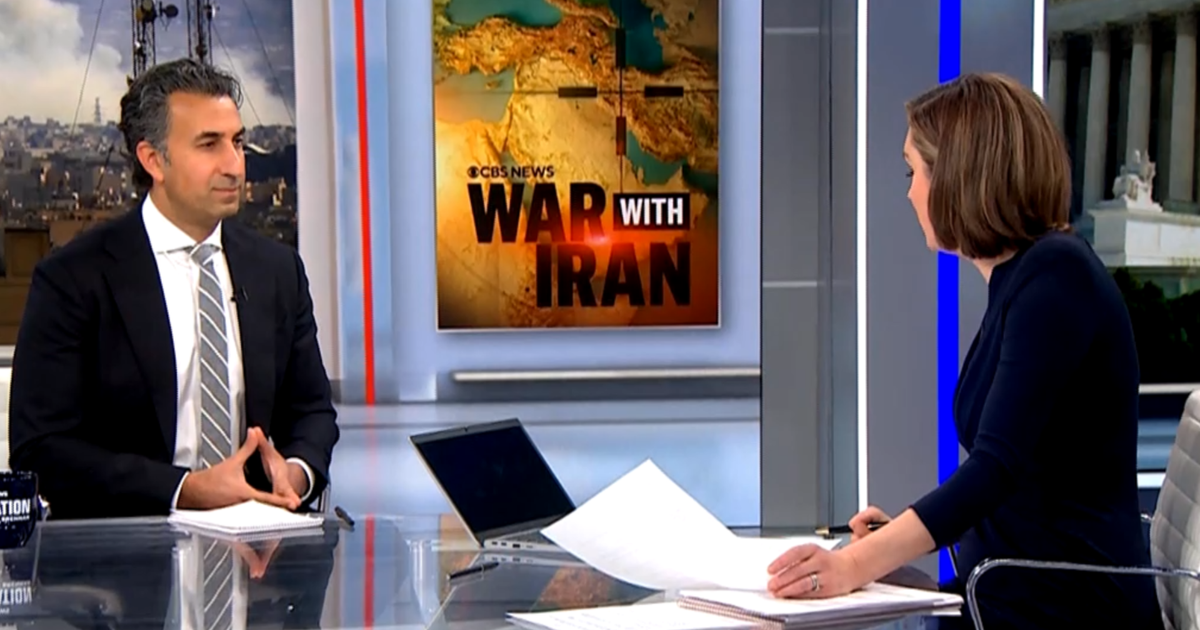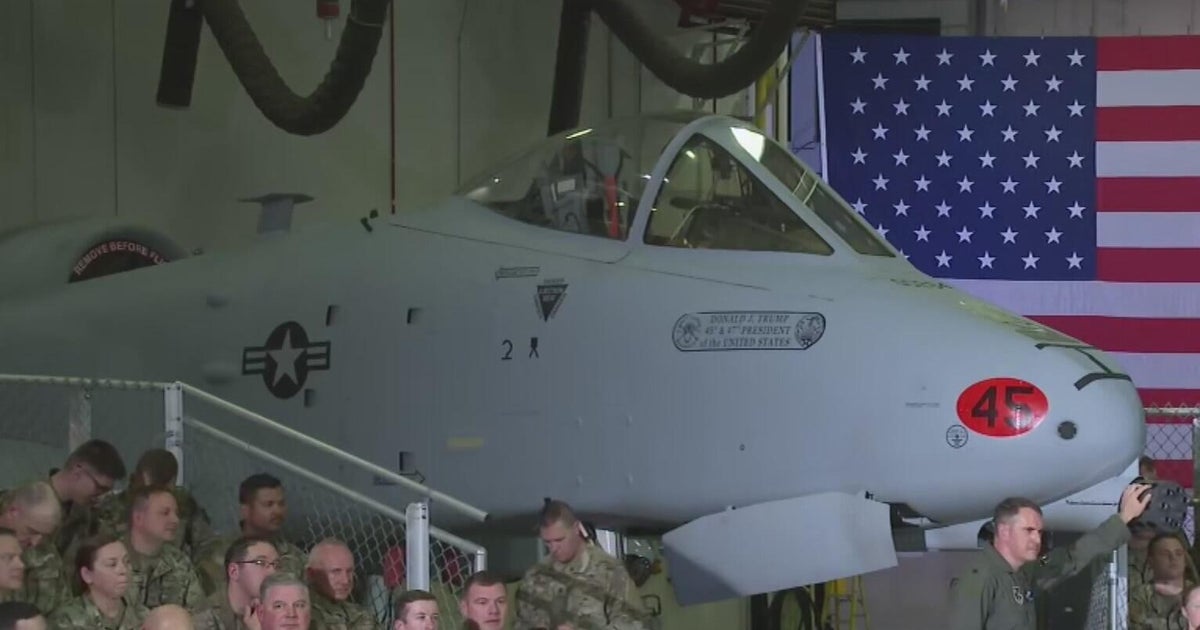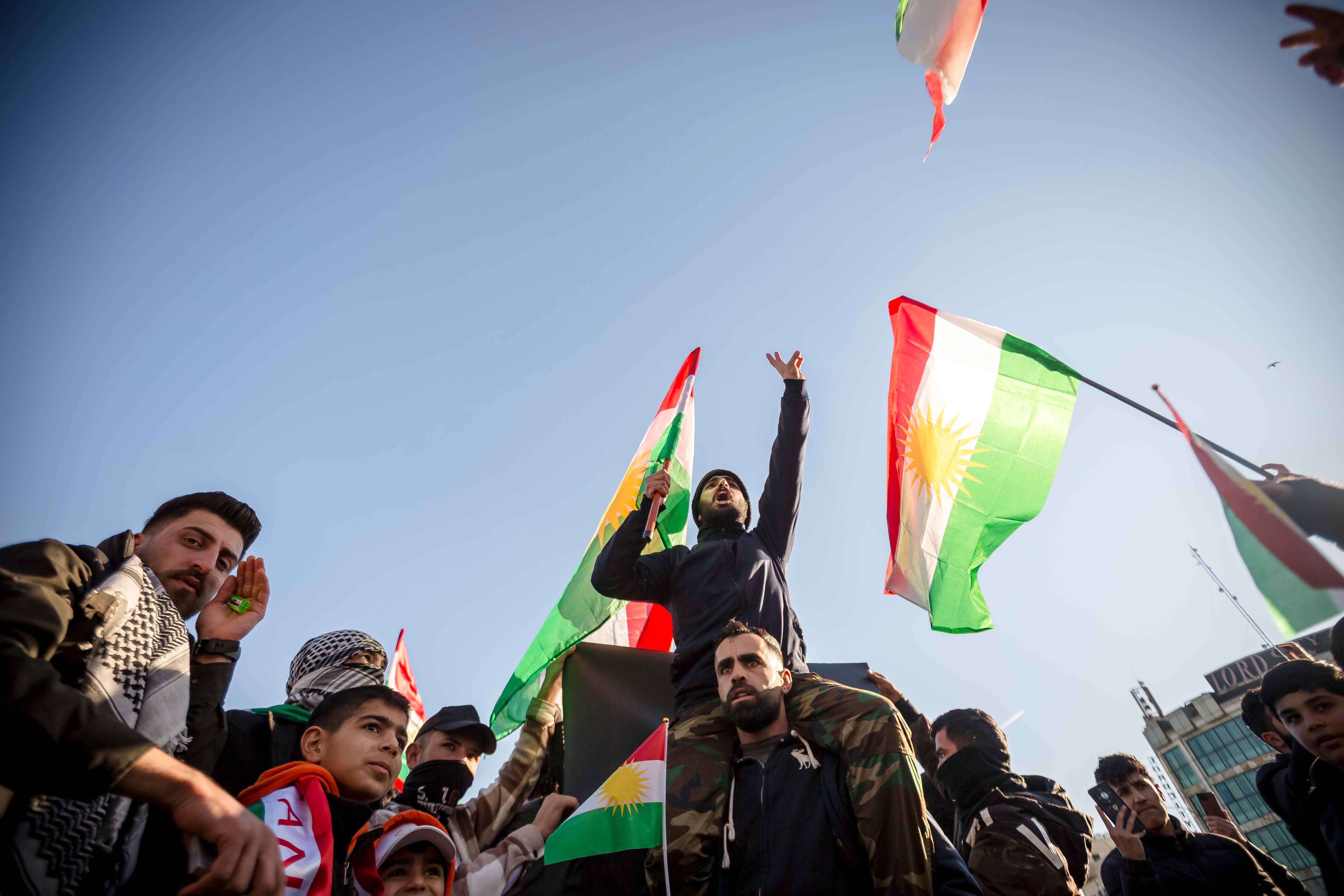Transcript: Secretary of Defense Mark Esper on "Face the Nation," October 13, 2019
The following is a transcript of an interview with Defense Secretary Mark Esper that aired Sunday, October 13, 2019, on "Face the Nation."
MARGARET BRENNAN: Good morning and welcome to FACE THE NATION. We are following two very big stories this Sunday. The impeachment investigation and the president's decision to pull U.S. troops out of Syria, a move that has turned into an international crisis. We begin this morning with the secretary of defense Mark Esper. Mr. Secretary welcome to FACE THE NATION.
U.S. SECRETARY OF DEFENSE MARK ESPER: Good morning Margaret thank you for having me.
MARGARET BRENNAN: The president pulled back from the border with Turkey but there are still about a thousand U.S. troops in Syria. Are you evacuating them?
SEC. ESPER: Look it's a very terrible situation over there. A situation caused by the Turks by President Erdoğan. Despite our opposition they decided to make this incursion into Syria. And at this point in time in the last 24 hours we learned that they likely intend to expand their attack further south than originally planned and to the west. And so we know that's happening. We also have learned in the last 24 hours that the Syrian forces intend- I'm sorry the Kurdish forces--
MARGARET BRENNAN: The SDF--
SEC. ESPER: -- are looking to cutting- the SDF, are looking to cut a deal if you will with the Syrians and the Russians to- to counter-attack against the Turks in the north. And so we find ourselves as we have American forces likely caught between two opposing advancing armies and it's a very untenable situation. So I spoke with the president last night after discussions with the rest of the national security team and he directed that we begin a deliberate withdrawal of forces from northern Syria.
MARGARET BRENNAN: A deliberate withdrawal from the entire country?
SEC. ESPER: From northern Syria.
MARGARET BRENNAN: From northern Syria.
SEC. ESPER: Right, which is where most of our forces are.
MARGARET BRENNAN: So, the 1000 troops--
SEC. ESPER: That's correct.
MARGARET BRENNAN: -- how long and over what time period will you be--
SEC. ESPER: Well--
MARGARET BRENNAN: --pulling back?
SEC. ESPER: -- it'll be a deliberate withdrawal and we want to conduct it as- as safely and quickly as possible. So we want to make sure we deconflict a pullback of forces. We want to make sure we don't leave equipment behind. So I'm not prepared to put a timeline on it, but that's- that's our general game plan.
MARGARET BRENNAN: You said you're doing this for U.S. force protection because of two advancing armies. Those armies are advancing after the U.S. had already pulled back. After the U.S. Air Force--
SEC. ESPER: Right.
MARGARET BRENNAN: -- that had controlled the airspace stopped doing so.
SEC. ESPER: Well we still have--
MARGARET BRENNAN: Do you actually believe they would advance if U.S. forces were there in the numbers and with the force and with the commander in chief saying don't do this?
SEC. ESPER: I do because in my lead up to talks with my counterpart of the past several weeks- I've been on the job a little bit over two months. It became very clear to me that the Turks were fully committed to conducting this incursion. And I think Secretary Pompeo would tell you the same. I know General Milley, the chairman of the Joint Chiefs of Staff, has heard the same. The Turks were committed to doing this. This should not be a surprise. If you go back in time to when we first began this relationship with the- with the Syrian Kurds at that time in 2014 the Turks were protesting at that moment.
MARGARET BRENNAN: Right.
SEC. ESPER: And it's gone on and on and since that time they've actually implemented three incursions into northern Syria.
MARGARET BRENNAN: But do you actually believe Turkey would fire on U.S. forces? We are NATO allies.
SEC. ESPER: Well I don't know whether they have- they would or they wouldn't. We have reports already of indiscriminate fire landing near American forces. But they just--
MARGARET BRENNAN: Was that accidental--
SEC. ESPER: Well we don't know--
MARGARET BRENNAN: Was that deliberate?
SEC. ESPER: We need to--
MARGARET BRENNAN: Was that reckless?
SEC. ESPER: We need to sort that out. We've given them the locations of our forces. But look, I- I've been to war. I know what wars like. There's a fog out there and things happen and we want to make sure we don't put our soldiers in a situation where they could be killed or injured. And look, even if the Turks decided not to attack forces- I mean they got over 15,000 forces. What we decide to pull back from that immediate zone of attack was about less than 50, maybe two dozen forces. It would be irresponsible for me to keep them in that position. And allow--
MARGARET BRENNAN: But you did have U.S. air force--
SEC. ESPER: And we still do--
MARGARET BRENNAN: --controlling the airspace?
SEC. ESPER: And we- and we still do. It was an coordinated arrangement between us and the Turks. And despite our protestations, despite the fact that we urged the Turks not to do this, they decided to do it and we told them that we would not support them militarily in this action.
MARGARET BRENNAN: So how does that not amount to a retreat? You're saying that the president of the United States, the commander in chief, said "don't do this" and then Erdoğan said, "I am" and he said Okay?
SEC. ESPER: Well I--
MARGARET BRENNAN: I'm not going to fire back--
SEC. ESPER: --I wouldn't characterize--
MARGARET BRENNAN: --I'm going to pull back?
SEC. ESPER: I- I wouldn't characterize it this way- that way. What I'm saying is we did not want to put American forces into harm's way. We did not want to get involved in a conflict that dates back nearly 200 years between the Turks and the Kurds and get involved in another- yet another war in the Middle East.
MARGARET BRENNAN: Well, when it comes to the forces you're talking about, the SDF you referred to, you said it has developed in the last 24 hours--
SEC. ESPER: Right.
MARGARET BRENNAN: --that you've learned, they've struck a deal with Russia.
SEC. ESPER: Well, they're working on a deal. I don't know that it's been finalized yet, but we're pretty confident that they will go in that direction barring some- we're trying to make some last minute interventions with President Erdoğan. But again my expectation is President Erdoğan would not agree to a cease fire. He would not agree to move back across the border which we've been pushing him to do. And so every- there's every expectation that the- again that the Syrian Kurds would cut a deal with the Syrian and Russian forces.
MARGARET BRENNAN: But to be clear, the reason the Syrian Kurds are striking a deal here is to protect themselves from being killed by Turkey.
SEC. ESPER: That's right.
MARGARET BRENNAN: But that's what the United States was doing for them. They were our allies that we were advising and assisting and protecting. It- it sounds a lot like they were being left to be slaughtered. So what choice were they left other than to find someone else to protect them?
SEC. ESPER: Look, the- this the Kurds have been very good partners in the D-ISIS campaign. They were very good fighters on the battlefield. We obviously enabled that as well. But at the same time, we didn't sign up to fight the Turks on their behalf. And we've been very clear with them about that. That's why since I came into office over two months ago I worked week after week with my defense minister counterpart from Turkey and urged them not to do this. We cited all the reasons that are now playing out. The biggest being the likely release of ISIS fighters from these camps and prisons, not just that we see a humanitarian crisis emerging. We- that this relationship between the United States and Turkey is being damaged. Their standing in NATO and Europe is being hurt. We see European capitals coming out and criticizing President Erdoğan for- for this- these actions. Everything that we told them- all the reasons why we told them not to do this are- are coming to bear.
MARGARET BRENNAN: And what price will they pay for it?
SEC. ESPER: Well, we'll see over time. You see that- that some European countries are already talking about specific sanctions and actions. The president is talking about the same. We should expect to see something like that along those same lines.
MARGARET BRENNAN: Doesn't that just drive them into the arms of Russia?
SEC. ESPER: I don't think so. We got to see how this plays out. But again we've got to take this one step at a time. It's a very fluid situation it's changing by the hour.
MARGARET BRENNAN: You- just in the past few hours online there have been videos circulating horrific videos showing execution of some of these Kurdish allies of ours. There are reports of hundreds of ISIS fighters and family members just running free. There are over a hundred thousand individuals fleeing this violence according to the U.N.. Does the United States have any idea who these forces are that Turkey is sending in, who these militias are?
SEC. ESPER: It's terrible. It's a terrible situation. We condemn it. We have condemned it. It's- these are justice things that we told the Turks would happen and play out. Who's conducting it, it's unclear at this point and time. There are Kurdish regular for- I'm sorry there are Turkish regular forces and there are Turkish proxy forces--
MARGARET BRENNAN: Right.
SEC. ESPER: --engaged as well.
MARGARET BRENNAN: And we don't know who they are?
SEC. ESPER: We don't know exactly- that's right. We don't know exactly who they all are and what they're doing. But we're hearing the same reports from the battlefield as well.
MARGARET BRENNAN: These are war crimes.
SEC. ESPER: It appears to be, if true, that they are- would be war crimes.
MARGARET BRENNAN: European allies are looking at this and when they hear the president say things like "these ISIS fighters will just flee to Europe," they say that is not appreciating the alliance, that Turkey has been far too permissive in allowing ISIS fighters within its territory. They see this as inevitable that we are headed towards a terrorist attack--
SEC. ESPER: We- we--
MARGARET BRENNAN: --because of this chaos that the U.S. is allowing in the vacuum.
SEC. ESPER: Well, let's be clear the United States is not allowing this. Turkey committed this action. They decide to make an incursion in northern Syria despite our protestations, our urgings not to do it, all of our warnings. They decided to do it. The situation with the ISIS--
MARGARET BRENNAN: But the U.S. is being permissive, arguably, by pulling back--
SEC. ESPER: We-we are--
MARGARET BRENNAN: --and not stopping them.
SEC. ESPER: We are doing what's in the interests of our service members not to put them in harm's way. Not to put 20, 30, 40 soldiers up against a 15,000 man army which is using airstrikes, artillery, and ground forces to prosecute a war against the Turks whose roots go back over 200 years.
MARGARET BRENNAN: If the US is fired at, do forces have the ability to defend themselves?
SEC. ESPER: They do--
MARGARET BRENNAN: Can they fire back?
SEC. ESPER: Absolutely. General Milley has made that clear to his counterpart. I made that clear to my counterpart. I warned him just the other day that they need to respect our positions on the ground. They need to respect our forces. And I reminded them that we had the right of self-defense and we will execute it if necessary.
MARGARET BRENNAN: I- I have so many more questions for you and we'll be watching over the coming days. Very quickly, are you going to comply with the subpoena that the House provided you and provide documents to them regarding to the halt to military aid to Ukraine?
SEC. ESPER: Yeah we will do everything we can to cooperate with the Congress. Just in the last week or two, my general counsel sent out a note as we typically do in these situations to ensure documents are retained.
MARGARET BRENNAN: Is that a yes?
SEC. ESPER: That's a yes.
MARGARET BRENNAN: You will comply with the subpoena?
SEC. ESPER: We will do everything we can to comply.
MARGARET BRENNAN: Okay, all right. Thank you very much Mr. Secretary. Appreciate it.
SEC. ESPER: Thank you, Margaret.
MARGARET BRENNAN: We'll be right back.




